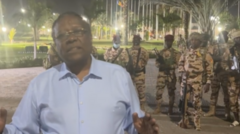The government of Chad has downplayed recent disturbances in its capital, N'Djamena, after gunshots were reported near the presidential palace. In a video recorded within the palace complex, Foreign Minister Abderaman Koulamallah referred to the incident as a "little incident," asserting that calm has been restored. According to sources connected to the government, clashes ensued between security forces and what is described as "terrorist elements."
A report by the French news agency AFP highlights that during the encounter, 18 attackers and one security personnel lost their lives. Chad, a landlocked nation in northern-central Africa, has historically struggled with instability, a legacy that has persisted since its independence from France in 1960. The country is currently under the leadership of President Mahamat Déby, who assumed power following the death of his father, Idriss Déby, in 2021 during a conflict against rebel factions.
Following the gunfire, military tanks were deployed to the area, and access to the palace was restricted, according to AFP. In his video address, Koulamallah, flanked by government forces, sought to reassure the public, stating, "Nothing serious has happened," and declared their readiness to defend the nation. He emphasized that any attempts to destabilize the government had been unsuccessful.
Koulamallah detailed that the attack was conducted by a 24-member commando unit, indicating that six attackers were wounded alongside three injured members of the government forces. Notably, this incident occurred shortly after a diplomatic visit from China's Foreign Minister, Wang Yi, who met with President Déby and other senior officials.
In the context of recent political developments, Chad held parliamentary elections last month, which the government positioned as an initial step toward a transition from military to civilian governance. However, opposition groups raised alarm over potential voter fraud and called for a boycott of the elections. The situation is further complicated by Chad's recent termination of its military cooperation agreement with France, a move Koulamallah described as essential for the nation to assert its sovereignty.
Chad is situated within a region termed the "Coup Belt," illustrating a troubling pattern of military takeovers in nearby nations such as Mali, Niger, and Sudan since 2020. The ramifications of the recent gunfire and the broader socio-political climate in Chad continue to be closely monitored as the government navigates challenges to its authority and security.


















